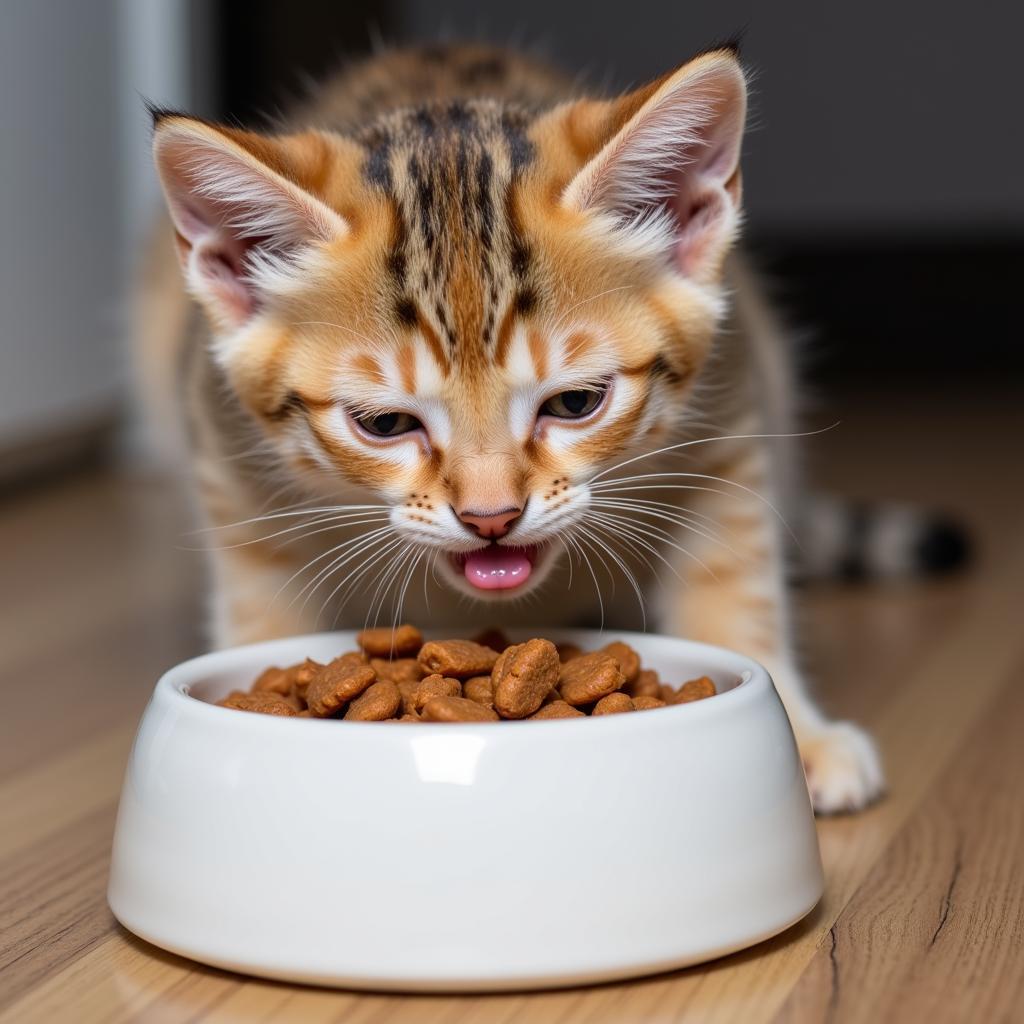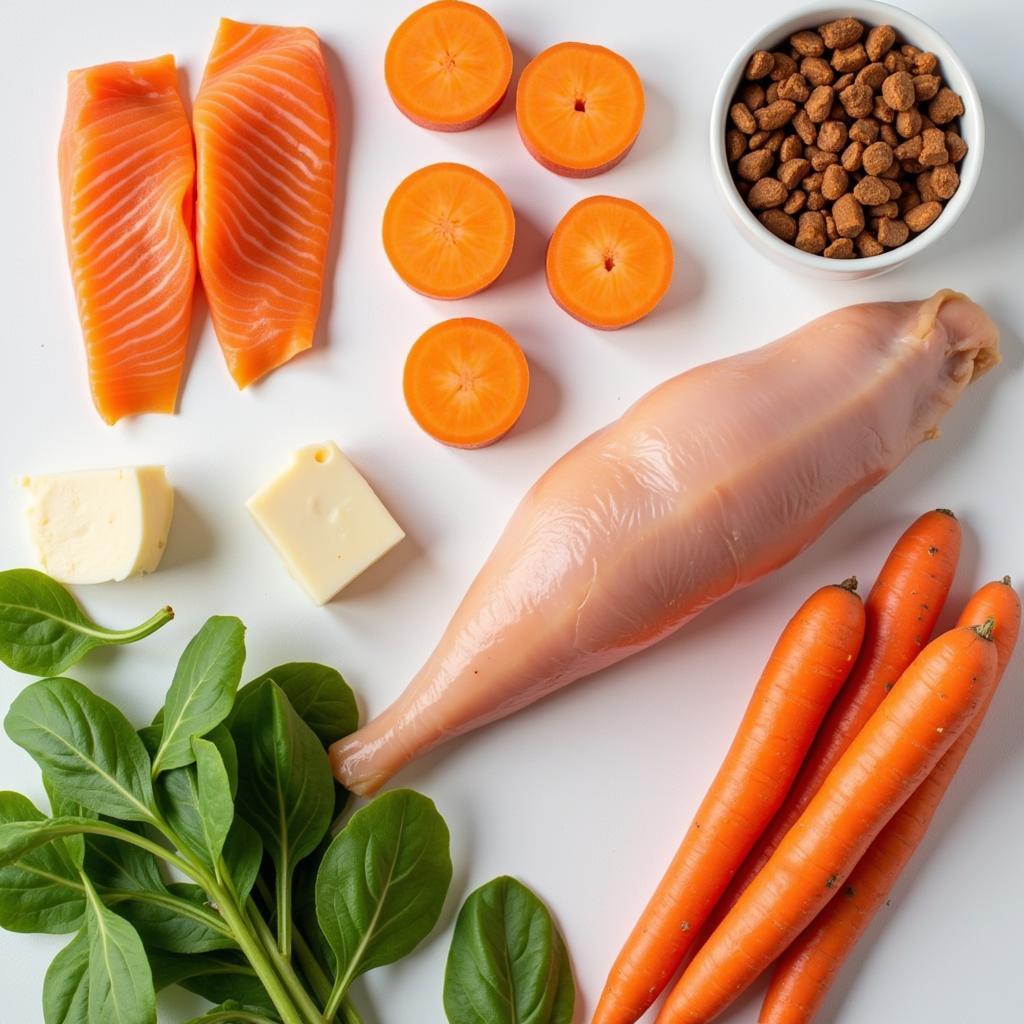Choosing the right food for your kitten is a big responsibility. Not only does it need to be tasty enough to tempt your little furball, but it also needs to provide all the essential nutrients for healthy growth and development. With so many options on the market, it can feel overwhelming. That’s why many pet parents are turning to grain free kitten wet food. But is it the right choice for your feline friend?
Understanding Grain Free Kitten Wet Food
Let’s unpack the term “grain free”. Grains like wheat, corn, and rice are often added to pet food as inexpensive fillers. While some cats tolerate grains well, others might experience digestive issues or allergies. This is where grain free options come in.
Grain free kitten wet food replaces these grains with alternative sources of carbohydrates like sweet potatoes, peas, or lentils. This makes it easier to digest for some kittens and can be particularly beneficial for those with sensitive stomachs.
 Kitten Eating Grain Free Wet Food From a Bowl
Kitten Eating Grain Free Wet Food From a Bowl
Why Choose Wet Food for Your Kitten?
While both wet and dry food have their pros and cons, wet food offers some unique advantages for growing kittens:
- Higher Moisture Content: Kittens are notoriously bad at drinking enough water, which can lead to dehydration and urinary tract issues. Wet food, being naturally high in moisture, helps keep your kitten hydrated.
- Increased Palatability: The soft, smooth texture of wet food is highly appealing to kittens, especially picky eaters.
- Nutrient Density: Wet food often packs a higher concentration of protein and essential nutrients compared to dry food, supporting your kitten’s rapid growth.
The Benefits of a Grain Free Diet for Kittens
While not all kittens need a grain free diet, many thrive on it. Here’s why:
- Easier Digestion: As mentioned earlier, grain free options can be gentler on your kitten’s digestive system, reducing the likelihood of upset stomachs, gas, and diarrhea.
- Potential Allergy Relief: If your kitten suffers from food allergies, switching to a grain free diet might help alleviate symptoms like itchy skin or digestive problems.
- Weight Management: Some grain free formulas prioritize protein and healthy fats over carbohydrates, which can be beneficial for maintaining a healthy weight in kittens.
 Ingredients in Grain Free Wet Food for Kittens
Ingredients in Grain Free Wet Food for Kittens
Choosing the Best Grain Free Kitten Wet Food: What to Look For
Navigating the world of pet food labels can be tricky. Here’s what to keep in mind when choosing a grain free option for your kitten:
- Named Meat Source: Look for food where the first ingredient is a named meat source like chicken, turkey, salmon, or beef.
- High Protein Content: Kittens need a diet rich in protein for muscle development and overall growth.
- Limited Ingredients: Opt for formulas with a shorter list of recognizable ingredients, avoiding artificial colors, flavors, and preservatives.
- Age-Appropriate Nutrition: Make sure the food is specifically formulated for kittens, meeting their unique nutritional needs.
FAQs About Grain Free Kitten Wet Food
Q: Is grain free wet food suitable for all kittens?
A: While grain free food can be beneficial for many kittens, it’s always best to consult with your veterinarian. They can assess your kitten’s individual needs and advise you on the best diet.
Q: Can I mix grain free wet food with dry kibble?
A: Yes, many pet parents choose to offer a combination of wet and dry food. Just ensure both options are kitten-appropriate and adjust feeding amounts as needed.
Q: What are some signs my kitten might have a grain allergy?
A: Common signs of food allergies in kittens include digestive upset (vomiting, diarrhea), itchy skin, hair loss, and ear infections.
Navigating Your Kitten’s Nutritional Journey
Transitioning your kitten to a new food, even a grain free option, should be done gradually. Start by mixing a small amount of the new food with their current diet, slowly increasing the ratio over a week or two. This allows their digestive system to adjust and prevents stomach upset.
Choosing the right kitten wet food grain free option is a significant step in providing your kitten with the best start in life. By understanding the benefits of a grain free diet and learning how to read pet food labels, you can make informed decisions that support your furry friend’s health and well-being. Remember, your veterinarian is your best resource for personalized advice on your kitten’s nutritional needs.
Expert Insight
“As a veterinarian, I often recommend grain free wet food for kittens, particularly those with sensitive stomachs or suspected food allergies. It’s a great way to ensure they receive essential nutrients while minimizing digestive discomfort.” – Dr. Sarah Williams, DVM
Remember, a healthy kitten is a happy kitten! By choosing high-quality, grain free wet food and providing a loving environment, you’re setting your feline companion up for a lifetime of purrs and cuddles.
For more helpful tips and product reviews on the best food for your feline friend, be sure to check out our articles on Diamond Kitten Food and Wags Cat Food.